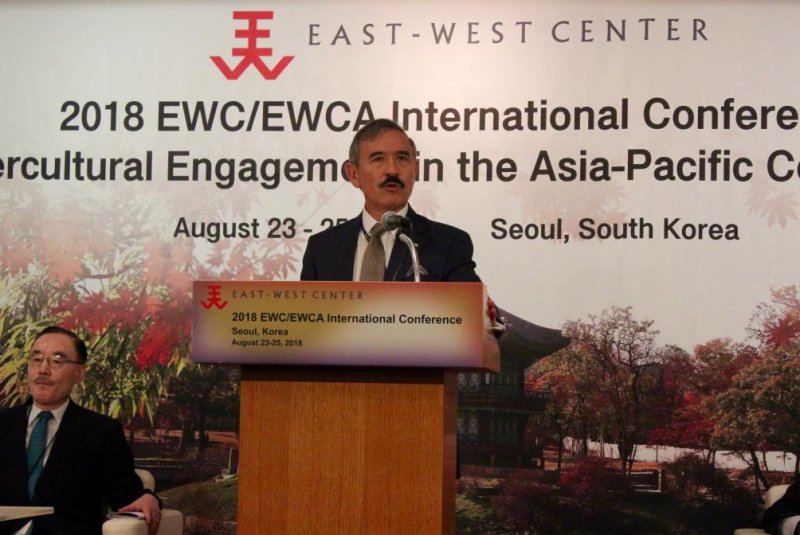U.S. Ambassador to South Korea Adm. Harry B. Harris addresses U.S. immigration policy Friday in Seoul. Photo by Elizabeth Shim/UPI
SEOUL, Aug. 24 (UPI) -- Newly arrived U.S. Ambassador to South Korea Adm. Harry B. Harris defended U.S. immigration and trade policies Friday at a forum on Washington's "Indo-Pacific' strategy in Asia.
Harris, who arrived in Seoul last month, stayed away from North Korea and focused instead on globalization and alliances at a discussion hosted in the South Korean capital by the East-West Center.
"On trade the U.S. position is clear: We seek a free and open Indo-Pacific region. We seek fair and reciprocal trade that's balanced with the rest of the world.
"I think for too long we in the United States have allowed the free trade framework to be distorted to the advantage of other countries, " the top U.S. diplomat to Seoul said, without referring to China by name.
By Thursday, U.S. and Chinese officials had ended two days of talks without a major breakthrough, as new tariffs began to be enforced.
"With regard to immigration, contrary to what many would have us all believe, the United States is in fact a welcoming home for immigrants, legal immigrants." Harris said.
"My mother immigrated to the United States with me, I immigrated also, [after] I was born in Japan."
The ambassador's comments on U.S. immigration come at a sensitive time. The Trump administration's policies came under attack again this week from top U.S. chief executives for "disrupting" the lives of their highly skilled employees.
The executives, including Tim Cook of Apple Inc., Jamie Dimon of JP Morgan Chase & Co., said the federal government was reviewing immigration in a way that "inflict substantial harm on U.S. competitiveness."
But on Friday Harris and his U.S. State Department colleague, Deputy Assistant Secretary of State Walter Douglas, appeared largely unfazed by recent reports of federal policies.
Douglas, a veteran diplomat previously posted to South Korea, said the administration's Indo-Pacific strategy is an initiative to hone competitiveness on both sides of the Pacific while "recognizing the economic reality in the region."
The "Indo" in Indo-Pacific not only comprises India, but also Nepal, Bangladesh, the Maldives and Sri Lanka, Douglas said.
"What we're doing is recognizing the new reality of where the economic growth is coming from in the region," he added, referring to a pledge from U.S. Secretary of State Mike Pompeo to provide a $113 million "down payment" or investment in a new Indo-Pacific era.
Douglas also suggested Friday the strategy is part of a larger plan to recognize the contribution of Asian immigration to the United States.
"A significant portion of our population comes from those countries. India alone accounts for 1 percent of the American population. You add in all the other Indo-Pacific populations you're probably getting up to close to 5 percent. What those citizens are demanding is that they want to have those ties, they want Americans to be connected to the region, as we always have, but with stronger ties than before."
The China Choice
Sri Lanka, one of the countries in the designated Indo-Pacific, recently signed a deal with China to lease the naval unit at one of its ports.
The Trump administration's Indo-Pacific strategy is seen by experts as a way to curb Chinese influence in the Indian Ocean.
Harris said China's One Belt, One Road initiative deserves a hard look for the way it is managed.
"I think it has to be a fair and sustainable investment," the U.S. ambassador said, but adding if the Chinese initiative is egalitarian it would be a "good thing."
U.S. allies like South Korea are largely welcoming the Indo-Pacific strategy, but Seoul has also stayed away from public announcements on the U.S. policy that has otherwise invited positive responses from countries like Japan and India.
That might be because South Korea "has a lot at stake in what China does," said Wongi Choe, a professor at Korea National Diplomatic Academy, adding South Korea has been "cautious" about the United States' Indo-Pacific strategy, even as the U.S. ally "concurs wholeheartedly" with the values of the policy.
The overall impression the strategy is a "check on China" has made South Korea think twice about embracing the policy.
"We don't want to do things that provoke China," Choe said.
The Singapore way
Even as longtime U.S. allies like South Korea and Australia are faced with the prospect of "choosing" between the United States and China for economic and political reasons, Singapore's Ambassador to Seoul Yip Wei Kiat told UPI his country, and its amicable ties with countries like China and North Korea, are based on other kinds of principles.
"One of those principles is we try to make as many friends as possible, and try to make as few enemies as possible," Yip said Friday. "This is for a small country, a no-brainer, in a way."
When hosting the U.S.-North Korea summit in June, the Singaporean government acted out of a "national interest" compatible with internationalism, Yip said.
"We were not a direct participant, but we tried our bit to contribute, to create a conducive environment," the Singaporean ambassador said.
"That is the best we can do, given our constraints."















